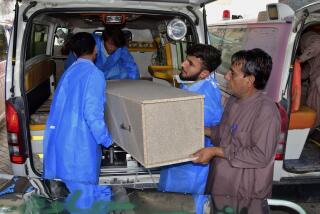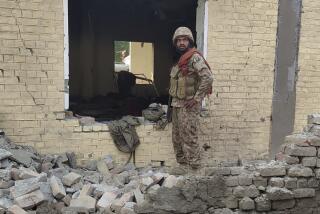28 Reported Killed in Attack on Afghan Bus; Kabul Blames Rebels
- Share via
ISLAMABAD, Pakistan — A rocket and grenade attack on a bus in western Afghanistan killed 28 people and badly injured 18, Kabul Radio said Saturday.
The radio said “extremist elements”--meaning anti-Communist guerrillas--carried out the attack Friday in the Herat region near the border with Iran.
“They martyred 28 innocent compatriots, including women and children,” said the radio, which was monitored by the British Broadcasting Corp. The radio said the bus was taking passengers from the city of Herat to their homes.
The report could not be independently confirmed.
On Dec. 17, one person was killed and eight people were wounded when a bomb exploded in a crowded shopping area in Herat.
Saturday’s report of the bus attack came on the eve of the eighth anniversary of the Soviet intervention in Afghanistan. An estimated 115,000 Soviet troops are in Afghanistan supporting the Kabul regime.
Guerrilla Renews Offer
Meanwhile, in neighboring Pakistan, an Afghan guerrilla leader Saturday renewed assurances of “a safe return” for Soviet troops once their withdrawal from Afghanistan has been decided.
Younis Khalis, leader of the seven-party Afghan opposition alliance based in Peshawar, in Pakistan’s North-West Frontier province, also rejected calls by Afghan President Najibullah for negotiations on a future coalition government.
Khalis, quoted by the official Pakistani news agency, said Najibullah is “a puppet soldier” of the Soviet Union and has no authority to put forward such an offer.
Soviet officials want to see an interim government planned before a withdrawal begins to ensure that a backlash would not kill withdrawing Soviet troops.
Najibullah announced a national reconciliation plan last Jan. 15, but the guerrillas rejected his power-sharing proposal and the United Nations indicated it was insufficient.
Khalis said that after the Soviet withdrawal, Afghanistan would be a nonaligned nation, a condition on which the Soviets have insisted.
More to Read
Sign up for Essential California
The most important California stories and recommendations in your inbox every morning.
You may occasionally receive promotional content from the Los Angeles Times.










